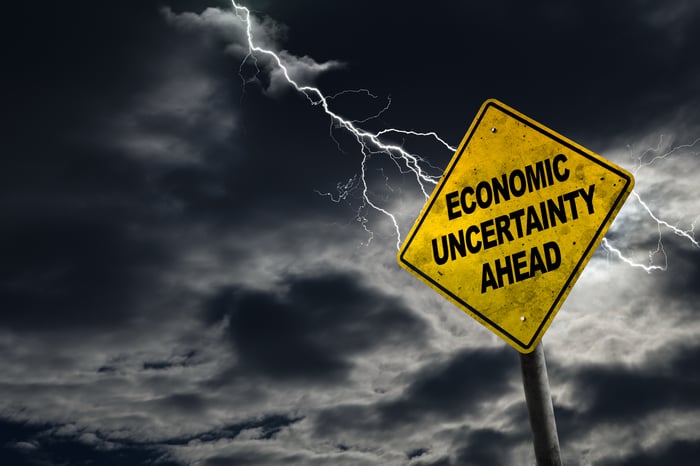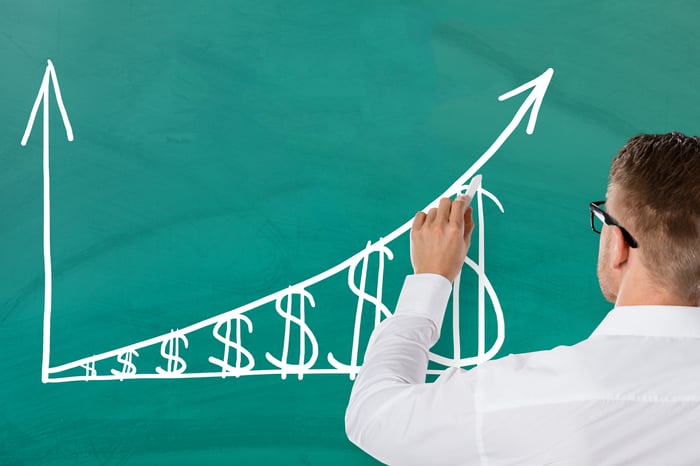While the global economy has continued expanding this year, there are several notable soft spots. U.S. manufacturing, for example, has been declining for the past few months, while recent data from the construction sector was also weak. Add that to the uncertainty surrounding the prolonged trade dispute between the U.S. and China, and it's increasing concerns that the global economy could be heading toward a recession. If that happens, the earnings of economically sensitive companies could be under pressure.
Some companies, however, have taken actions to insulate themselves from the ebbs and flows of the global economy. One company that has made its business recession-proof is Brookfield Infrastructure Partners (BIP -1.74%). It will therefore thrive next year even if the economy heads into a recession. As a result, the company will have no problem continuing to increase its 3.9%-yielding payout next year, making it an ideal option for dividend investors to buy if they're concerned about the economy.

Image source: Getty Images.
The recession-ready foundation
Brookfield Infrastructure Partners has done several things to ensure that it can easily withstand the next recession. Topping that list is that it operates a globally diversified portfolio of infrastructure businesses that generate stable cash flow. Overall, regulatory frameworks or long-term contracts supply 95% of the company's annual earnings. Because of that, a slowdown in the global economy would have a minimal impact on its cash flow.
Brookfield further insulates itself from the effects of a weaker global economy by having a top-tier balance sheet. That includes having a strong investment-grade credit rating backed by low leverage metrics as well as lots of liquidity. As of the end of the third quarter, for example, it had $2.2 billion in cash and borrowing capacity, which gives it plenty of financial flexibility. Meanwhile, that number should grow, since it's in the process of selling several non-core businesses.
Finally, the company has plenty of cushion when it comes to covering its high-yielding distribution. It will exit the year with a cash flow run rate of $3.50 per unit, which implies a payout ratio of around 57%. That's below its 60% to 70% target range.
All the fuel needed for accelerated growth in 2020
Thanks to its growth-focused initiatives in recent years, Brookfield has lots of momentum as it heads into 2020. The company expects its cash flow from existing operations to grow toward the high end of its long-term target range of 6% to 9% per year, thanks in part to the expansion projects it has completed over the past year.
In addition, the company expects to close several high-return acquisitions early next year. Those deals alone will boost its annual earnings run-rate to $3.75 per unit by the end of the first quarter. Add it up, and Brookfield Infrastructure should deliver double-digit cash flow growth next year even if a recession rocks the global economy.
With a dividend payout rate toward the low end of its target range, and high-octane earnings growth ahead, Brookfield Infrastructure appears to have plenty of fuel to increase its dividend at the high end of its 5% to 9% annual target range.

Image source: Getty Images.
A history of taking advantage of recessions
Because Brookfield generates steady cash flow and has a top-notch balance sheet, it enters recessions from a position of strength. That has enabled the company to take advantage of past downturns to buy businesses from sellers in a weakened state. In 2016, for example, lower oil prices and a political scandal forced Brazilian oil giant Petrobras to sell assets so it could pay down debt. One of those was a large-scale, high-quality natural gas pipeline system backed by long-term contracts. Brookfield was able to buy that business at an excellent value because it faced little competition from rival bidders during a recession in Brazil's economy. That gave it the fuel to deliver high-octane growth in the following year.
With plenty of liquidity, Brookfield has the financial flexibility to pounce on deals that might arise during the next recession. It stands to potentially benefit from a downturn, which adds to its appeal as a stock to own during a recession.
Ready for whatever may come in 2020
Brookfield Infrastructure built its business with recessions in mind. That's why it always aims to hold infrastructure assets that generate steady cash flow in good times and bad, while also having a rock-solid balance sheet.
However, it's exceptionally well insulated if a recession hits next year since it has several acquisitions on track to close in the coming months. Add that to its expected high-end organic growth, and Brookfield should be able to boost its dividend at a healthy rate next year. Meanwhile, with plenty of financial flexibility, it has the firepower to pounce if a recession-related opportunity arises. Those factors make it a great stock for income-seeking investors to own if they're concerned about a recession hitting next year.





